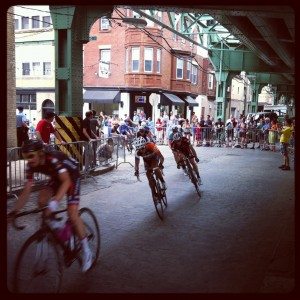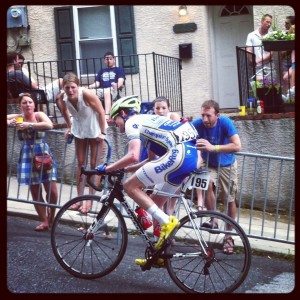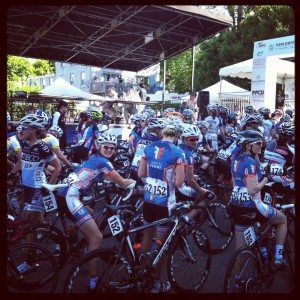 Over the weekend I had the pleasure of attending the Parx Casino Philly Cycling Classic with the finish atop the legendary Manyunk Wall. The close atmosphere of the event, combined with a large, high quality field allowed spectators and fans an amazing opportunity to get up close and personal with the action and the main protagonists in the field.
Over the weekend I had the pleasure of attending the Parx Casino Philly Cycling Classic with the finish atop the legendary Manyunk Wall. The close atmosphere of the event, combined with a large, high quality field allowed spectators and fans an amazing opportunity to get up close and personal with the action and the main protagonists in the field.
Not only did we watch the Bicycling Classic (which allowed anyone who had a bike and $25 to pin on a number and do a couple laps of the wall) but we were able to watch a brutally hard women's race and an action packed men's race. As the day wore on and we watched as riders suffered for the glory of the win, the QOM/KOM points, the points jersey and even just to stay in the race, it occurred to me that events like the Philly Classic cement cycling's foundation of a sport full of heroes. The more I pondered the events of the day, the more I realized why we react to cycling the way we do.
And honestly, it made me think about who my heroes are. Perhaps you'll consider who yours are as well.
The Sport of The Common Man
It was said during the early part of the 20th century that cycling was the sport of the common people. Everyone owned or had access to a bike, and everyone had the ability to ride it. As opposed to some skill based sports where you “either have it or you don't”, it's common to be able to take a couch potato and develop them into a reasonably competitive bike racer. The point simply is that everyone has the capacity to be a strong cyclist, and this is what sets the stage for a sport of heroes.
For example, we go out to a race such as Philly and we see a couple of hundred people (professionals) that we can actually relate to. How many of us can relate to Michael Jordan or Eli Manning, even if we happen to play basketball or football? The gap between the amateur in us and the pro in them is less a gap and more of a chasm in those sports. With cycling, we see people that are (almost) like us, using equipment we can buy in our local bike shop (admittedly at a cost) and “playing” in terrain that we can easily compete in ourselves. Can you say the same about Giant Stadium? Didn't think so.
So what is it that makes us adore bike racers so much if they are just like us?
Those We Wish To Emulate
 Maybe this should be more appropriately entitled “those we wish we could be.” We have this romantic image of a bike racer as an almost tragic figure. They give up everything, every semblance of normalcy in our everyday world, just to be able to do what they love to do. They awaken at ungodly hours, spend long, tiring days on the bike suffering through endless training miles. Their diets are strictly regulated in preparation for their moment of glory in the field of competition. Once there, they suffer unbearably and die a thousand deaths in front of our eyes, all the while chasing glory. In many cases, they have an inner strength (and don't get me wrong, genetic potential and talent) that we don't have and wish we could possess. The ability to will one's body into another dimension of pain and suffering, and the romantic image we've built upon that ability have led us to adore and emulate those athletes.
Maybe this should be more appropriately entitled “those we wish we could be.” We have this romantic image of a bike racer as an almost tragic figure. They give up everything, every semblance of normalcy in our everyday world, just to be able to do what they love to do. They awaken at ungodly hours, spend long, tiring days on the bike suffering through endless training miles. Their diets are strictly regulated in preparation for their moment of glory in the field of competition. Once there, they suffer unbearably and die a thousand deaths in front of our eyes, all the while chasing glory. In many cases, they have an inner strength (and don't get me wrong, genetic potential and talent) that we don't have and wish we could possess. The ability to will one's body into another dimension of pain and suffering, and the romantic image we've built upon that ability have led us to adore and emulate those athletes.
We adore and emulate them to such an extent that we follow them on on social media: whereas in the past we had to be at a race to interact with our idols, we are now able to follow their every move, every moment of suffering, every defeat and every triumph on Twitter, Facebook and Strava. Compared to the days in which we might catch a fleeting glimpse of our stars as they flew past, we are now firmly entrenched in the mystique of our favorite cyclists. Thusly, the proverbial “starstruck twinkle” we get in our eyes when we are able to spectate is all the more powerful an emotion. Really though, how invested are we in these tragic heroes?
Crushing Defeat
The question of how invested we are in our cycling heroes has become abundantly clear in the past few months with the revelations surrounding US Postal and the Lance Armstrong affair. Many, many people were shattered to hear the revelations surrounding the systematic doping of Armstrong, whom they considered a hero beyond reproach. Therein lies (what I believe is) the telling factor of how invested we are in those cyclists whom we admire and emulate. When we begin to empathize with them, celebrating their successes and being crushed by their defeats, we know that we've become invested in them. They've become a hero to us through their grit, their passion, their humbleness in victory and their graciousness in defeat.
 I realized this over the weekend during the women's race. After having followed the Fearless Femmes p/b Pure Energy Cycling – Vie13 throughout the season, after having watched their criterium podiums and wins (17 for 17) on live feeds and after having watched them win in person, it was crushing to experience their bad luck at Philly. After Kimberley “Kimbers” Wells (Australian National Criterium Champion) won at Somerville, the team had been riding high all week, hoping to put on a show in their big local circuit race through Manyunk. Four of the Femmes set out with a guest rider, but all was to come undone midway through the first lap when a crash took out around 40 women, including the Femmes. Kimbers, Theresa “The Comet” Cliff-Ryan and Kate “BFK” Veronneau all hit the deck hard, while Erin “Silly” Silliman and Jody Wells (the Femme's guest rider) were held up by the crash.
I realized this over the weekend during the women's race. After having followed the Fearless Femmes p/b Pure Energy Cycling – Vie13 throughout the season, after having watched their criterium podiums and wins (17 for 17) on live feeds and after having watched them win in person, it was crushing to experience their bad luck at Philly. After Kimberley “Kimbers” Wells (Australian National Criterium Champion) won at Somerville, the team had been riding high all week, hoping to put on a show in their big local circuit race through Manyunk. Four of the Femmes set out with a guest rider, but all was to come undone midway through the first lap when a crash took out around 40 women, including the Femmes. Kimbers, Theresa “The Comet” Cliff-Ryan and Kate “BFK” Veronneau all hit the deck hard, while Erin “Silly” Silliman and Jody Wells (the Femme's guest rider) were held up by the crash.
Awaiting their arrival on the Manyunk Wall's steepest pitch with cowbell in hand I was itching to cheer for our local squad and encourage a group of tough-as-nails women to turn themselves inside out for 400 meters of sheer hell. When the action came, I was perplexed to see a small peloton climb past us, sans Femmes. I was more puzzled to see dribs and drabs of groups coming through in the following minutes, with only two of the Femmes among them. After I began seeing torn bibs and bleeding bodies going by, including Theresa (who grinned and showed off her bloodied elbow for the camera moto) I began to realize that something had gone terribly wrong on that first lap. However, not seeing Kimbers or BFK coming through wasn't only odd, but actually left me feeling a sense of worry and dread. Were they injured? Broken bikes? Bones? DNF or trip to hospital? As the team car whizzed by with a single bike on the roof (coincidentally number 151), chain dangling from a limp derailleur, I knew there had been carnage.
It wasn't until 20 minutes later when we encountered Kimbers plodding up the sidewalk, bloodied and stone faced, her broken bike in tow. Upon asking her “are you ok, are you hurt?” she broke the story of what happened in the crash, relating Kate's trip to the ambulance and smashed Parlee. After chatting for a moment or two and wishing her well, she continued up the wall to clean up and tend to her wounds, leaving me to ponder why I was suddenly filled with both concern for a fallen rider and relief that one of the “MIA” riders was torn up a little, but indeed ok. It occurred to me at that point that my simple question of “are you ok” could have been annoying, but in the moment and said with genuine concern, it prompted her to stop in her tracks and let out her frustration with what had just happened.
That's What Makes A Hero(ine)
And that, my friends, is what a hero is. A battered, bleeding racer who was barely able to practice her craft that day and was (very likely) extremely upset at the circumstances surrounding her race, took a few minutes to stop and talk to inconsequential me. Sure, I pin on a number from time to time so there's some semblance of understanding for what they go through, but my racing is inconsequential compared to someone who wins national titles and beats the best in the country on any given day. Maybe it was annoying in the moment, maybe it was endearing, I don't know. So many times we as fans can be an annoyance to athletes (without trying to be of course) in our quest to show a little of that “starstruck twinkle”. But more times than not, just the simple act of caring about them, following their daily goings on, rooting for them in their races, congratulating their triumphs and consoling their disasters…it all makes a difference. When you become invested like that, you realize who inspires you and who your heroes are. Screw Lance. Who needs him? I've got all the inspiration and all the heroines I need right here close to home, in a Fearless group of women who are not only killers in the field, but genuinely some of the nicest people I've had the pleasure of meeting.
I hope that all those inspirational racers know that.
So….who are your heroes?